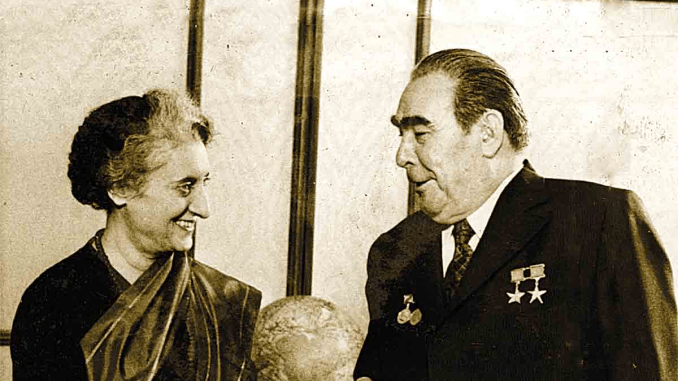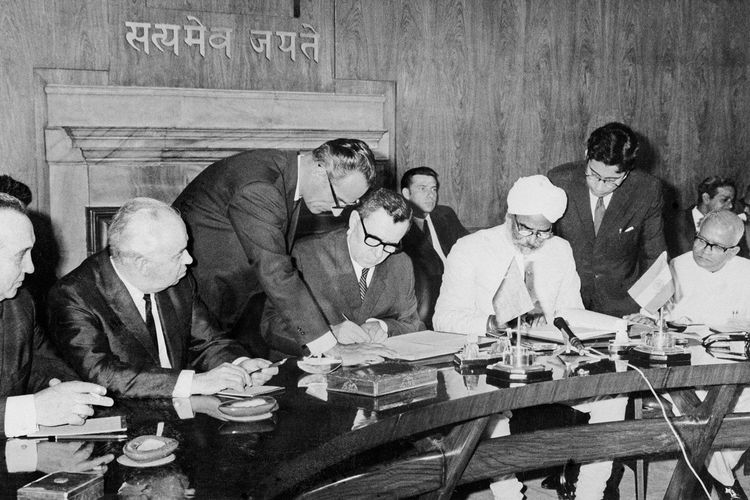
As August 9 marks the 50th anniversary of the historic Indo–Soviet Treaty of Peace, Friendship and Cooperation signed between India and the Soviet Union in August 1971, the relations can be best summed up in the words of diplomat turned politician S. Jaishankar who said that in the last forty years the world has changed, but, what has been constant is actually the relationship between India and Russia. Who should know better than Jaishankar who had been posted in Moscow 1979-81.
The treaty saw enhanced mutual strategic cooperation though critics may say that it was a significant deviation from India’s previous position of non-alignment during the Cold War. The treaty gave the strength to India at a time when USA under President Richard Nixon took a tilt towards Pakistan and moved the Seventh Fleet into the Indian Ocean close to the Indian shores. This was because Pakistan had played a key role in Sino-US ties as Secretary of State Dr Henry Kissinger flew to Beijing from Pakistan in what started the Ping Pong diplomacy. The Indo-Soviet Treaty of 1971 gave the much needed support to India during the course of the 1971 Indo-Pakistan war which led to the formation of Bangladesh with the Indian troops liberating that nation.
Since the dissolution of the Soviet Union, Russia inherited its close relationship with India which resulted in both nations sharing a Special Relationship. This relationship was a “special and privileged strategic partnership”. Owing to the bonhomie shared by the countries’ respective leaders, Prime Minister Narendra Modi and President Vladimir Putin, the bilateral relationship has seen further growth and development.An informal meeting between them in 2018 at Sochi helped accelerate the partnership, with increased interaction and cooperation between India and Russia.
The duration of the Indo-Soviet treaty was of 20 years and it was renewed for another 20 years on August 8, 1991. Following the dissolution of the Soviet Union it was replaced by a 20 year Treaty of Indo-Russian Friendship and Cooperation during President Yeltsin’s visit to New Delhi in January 1993.
The Indo-Russian Inter-Governmental Commission (IRIGC) which is the main body that conducts affairs at the governmental level between both countries has been described as the steering committee of Indo-Russia relations. It is divided into two parts, the first covering Trade, Economic, Scientific, Technological and Cultural Co-operation. This is normally co-chaired by the Russian Deputy Prime Minister and the Indian External Affairs Minister. The second part of the commission covers Military Technical Co-operation which is co-chaired by the two countries respective Defence Ministers. Both parts of IRIGC meet annually.
In addition to the IRIGC, there are other bodies that conduct economic relations between the two countries. These include, the Indo-Russian Forum on Trade and Investment, the India-Russia Business Council, the India-Russia Trade, Investment and Technology Promotion Council and the India-Russia Chamber of Commerce. There are five components of Indo-Russian relations and these are (1) politics (2) defence (3) civil nuclear energy (4) anti-terrorism cooperation and (5) space. Recently a sixth component has been added and this is trade with both nations looking forward to develop a free trade agreement. But, what has been most striking in the two countries relationship is in the defence sector as India is the second largest market for the Russian defence industry. In 2017, about 68 per cent of Indian military hardware import came from Russia making that country the chief supplier of defence equipment.
But, it is to the credit of India that in recent times, it has managed to balance this defence cooperation with the U.S. too and concluded several treaties with the US without impacting on Indo-Russian relations. Apart from this, India and Russia are also members of two groupings – BRICS (Brazil, Russia, India, China and South Africa) as also Shanghai Cooperation Organisation (SCO). The Shanghai Cooperation Organization (SCO), or Shanghai Pact, is a Eurasian political, economic, and security alliance, the creation of which was announced on June 15, 2001 in Shanghai, China by the leaders of China, Kazakhstan, Kyrgyzstan, Russia, Tajikistan, and Uzbekistan; the Shanghai Cooperation Organization Charter, formally establishing the organization, was signed in June 2002 and entered into force on September 19, 2003. The original five members, with the exclusion of Uzbekistan, were previously members of the Shanghai Five group, founded on April 26, 1996. Since then, the organization has expanded its membership to eight states when India and Pakistan joined SCO as full members on June 9, 2017 at a summit in Astana, Kazakhstan.
Another significant aspect of growing relations between India and Russia is the scheduled holding of the first 2+2 ministerial meeting later this year before a summit between Prime Minister Narendra Modi and Russian President Vladimir Putin. This was similar to the 2+2 with the US showing how India is deftly managing a tight rope considering the prevailing US – Russian tensions and a virtual Cold War between the two though not of the one prevalent during the time of erstwhile Soviet Union.
On India-Taliban talks, a senior Russian diplomat said it was India’s sovereign decision and it was useful to deal with everyone in the region. “Taliban is present in Afghanistan also in a manner it is a party to intra-Afghan talks. Certainly, it will be useful to deal with everyone in the region so that national interests will be better ensured,” said Russian Deputy Chief of Mission Roman Babushkin.
There was a minor hiccup in the Indo-Russian relations when for the first time in the last two decades, India and Russia did not hold their annual summit. This comes after Moscow expressed severe reservations on New Delhi joining the Indo-Pacific initiative and Quad, thereby tilting more towards the US. India and Russia have been holding the annual summit, which is the highest institutionalised dialogue mechanism in the strategic partnership, since 2000 when the ‘Declaration on the India-Russia Strategic Partnership’ was signed.
This is the first year, when despite several high-level visits tensions have begun to simmer in the bilateral ties over Russia’s rhetoric against India’s increasing alignment with the US. The bilateral ties between India and Russia were upgraded to ‘Special and Privileged Strategic Partnership’ from ‘Strategic Partnership’ in December 2010 during the visit of the Russian President Vladimir Putin to India.

“There is indeed some discontent over Russia’s repeated comments on India and casting aspersions over New Delhi’s decision to join the Quad,” said an Indian official adding that the summit may take place early next year.
So far, 20 annual summit meetings have taken place alternatively in India and Russia. The last summit — 20th India-Russia Bilateral Summit — was held in September 2019 for which Prime Minister Narendra Modi had visited Vladivostok. Prior to that, President Putin visited New Delhi in October 2018 for the 19th annual summit.
Sources also said while a virtual summit was planned around September-October this year, the plans did not fructify even as Russia tried to play the role of a mediator, mediating peace between India and China over the border standoff. In fact, during both the visits of Defence Minister Rajnath Singh to Moscow in June and then in September last year, Russia discussed the Line of Actual Control (LAC) issue with India.
In September last year, during the RIC (Russia-India-China) meeting, it was Moscow that facilitated a meeting on the sidelines between External Affairs Minister S. Jaishankar and Chinese Foreign Minister and State Councillor Wang Yi. This took place post the Galwan clash in which 20 Indian soldiers lost their lives while fighting the Chinese troops. Presently, Russia is the chair of RIC, SCO and BRICS – all of these meetings went on smoothly.
However, even though in recent times there have been ups and downs in the relations between the two countries, but, overall, Russia continues to be occupying an important space in India’s foreign policy and India too has maintained a fine balance between Russia and USA. What is indeed creditable is that India has had good rapport with both White House and Kremlin and currently it has become a strategic partner with both nations also showing the importance these two attach to their relations with India.
Considering the present scenario where China in the Covid 19 period has been toughening its posture be it on the Sino-Indian border or in South China Sea or Taiwan, India therefore occupies a position where nations like both US and Russia need to counter the wolf warrior diplomacy of China.
– The writer is a senior journalist and media consultant. The views expressed are of the writer and do not necessarily reflect the views of Raksha Anirveda.








